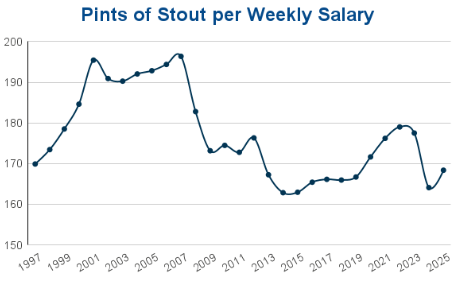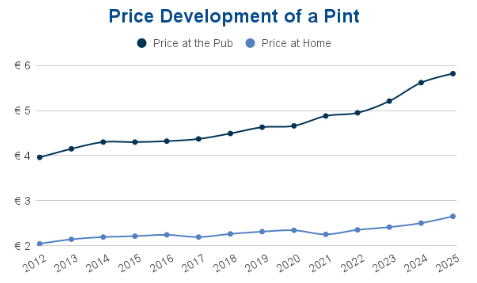Guinness Index 2025: Pint Purchasing Power Rebounds on St Patrick’s Day
Raisin Bank’s latest annual Guinness Index brings good news for stout lovers: after years of decline, pint purchasing power has finally bounced back.
For the first time since 2015, the Guinness Index shows an increase in the number of pints the average Irish weekly wage can buy. Over the past year, a 6% rise in wages has pushed the figure up to 168 pints, four more than in 2024. While this is a welcome improvement, the Index still lags behind 1997’s level by just a single pint—and remains well below the all-time peak of 196 pints in 2007.
- The stout-to-wage ratio peaked in 2007, with drinkers then able to buy 196 pints of the black stuff with the average weekly salary.
- Pub stout prices have gone up significantly faster (35%) than prices of pints at home (20%) in the past ten years.
- The average pint of Guinness now costs €5.82, an increase of almost a full euro (+94 cents) in the space of four years.
Pub prices outpace take-home pints
It’s hard to walk the streets of Dublin, Cork or Limerick without hearing pubgoers complain of exorbitant pint prices. Over the past decade (2015-2025), the price of a pint in pubs has risen 35% compared to just 20% for take-home cans. A pub pint was exactly twice as expensive as a supermarket can in 2015, but in 2025, it now costs 2.2 times as much (but offers over double the fun as well).
Brewers and pubs alike are under pressure, with Diageo recently announcing a further 6% price hike on draught beer from February. The average price of a pint of Guinness now stands at €5.82, up by nearly a full euro (+94 cents) in just four years.


"A Pint of Good News" – Raisin Bank’s Take
Eoghan O’Hara, Country Head for Raisin Bank Ireland, commented: "After years of decline, it’s great to see pint purchasing power rebounding—just in time for St. Patrick’s Day. While the cost of a pint continues to climb, the rise in wages means Irish pubgoers can finally raise a glass to some good news. That said, we’re still one pint short of 1997 levels—so there’s room for another round of economic growth!"
As Ireland gears up for its biggest celebration of the year, drinkers can take some comfort in knowing their wages stretch just a little further at the bar. Whether that’s enough to keep up with rising pint prices remains to be seen—but for now, it’s a reason to toast.
Expert Advice from The Guinness Guru
No one knows a good pint better than Daragh Curran, aka The Guinness Guru, who had this to say ahead of the big day: "If you’re heading out for a few pints this Paddy’s Day, remember—perfection is all about patience. Let the pint settle properly, look for a creamy dome on top, and for the love of all things holy, don’t grab the pint from the counter before it has been topped up! And if you find yourself paying over seven quid, maybe it’s time to find a new local.”
About the index
The Irish Central Statistics Office (CSO) collects data on wages and prices and tracks historical developments. A pint of draught stout at a bar is one of the components of the Consumer Price Index. Historical data from 1997–2025 was collected from the current and historical CSO Databases (CPM04/CPM08/CPM12). Data on average weekly wages in Ireland was collected from the current and historical databases of the CSO (EHQ04/QIMA1). Inflation data from database CPM03. Calculations and graphs by Raisin Bank. Prices before the introduction of the euro converted at the fixed exchange rate as of 1 January 1999.